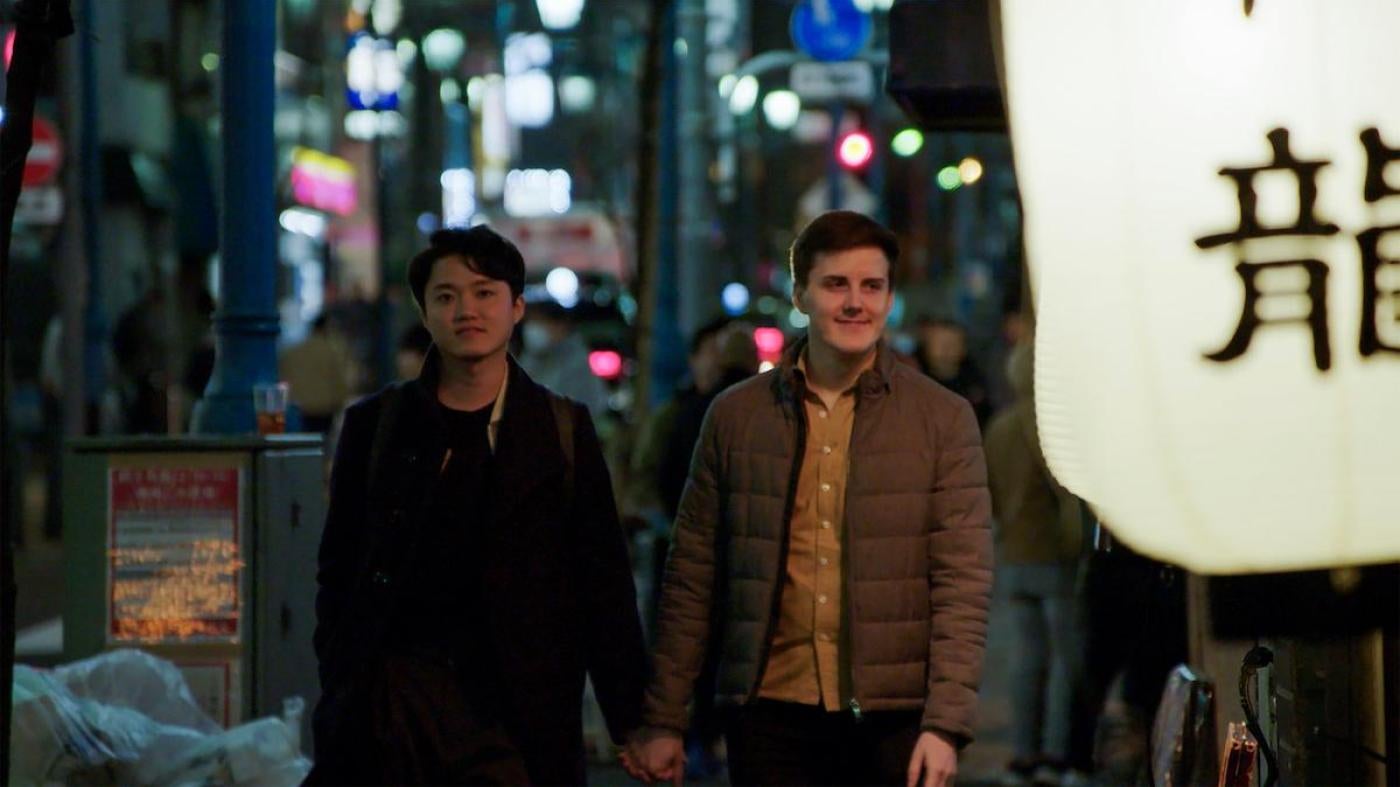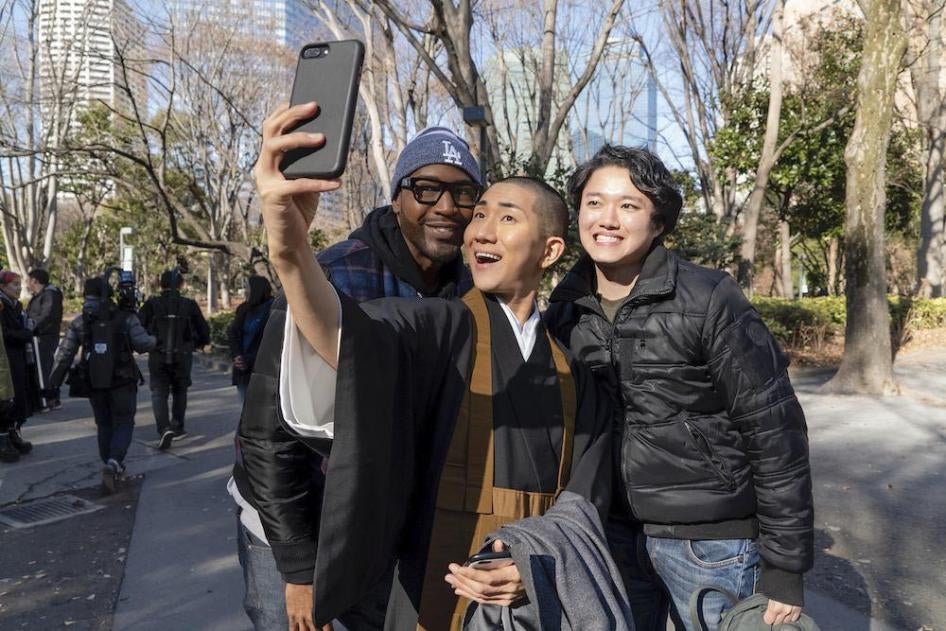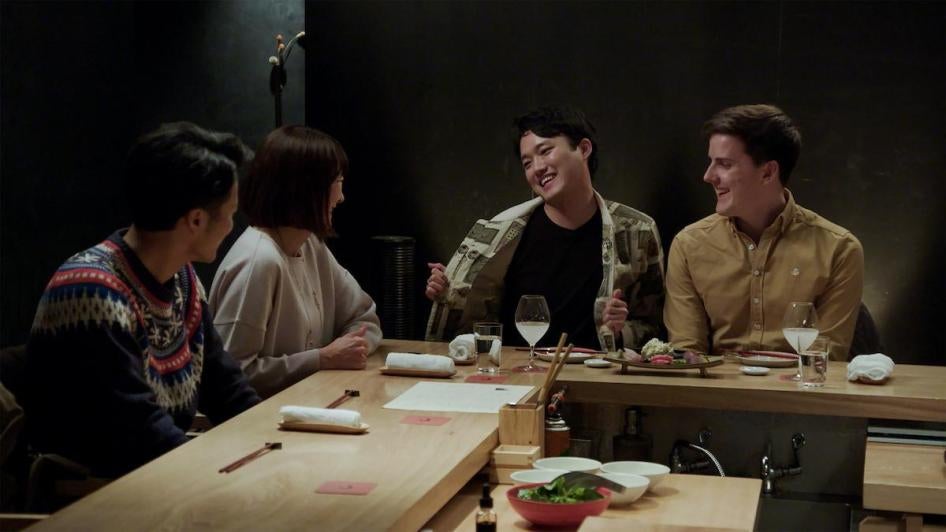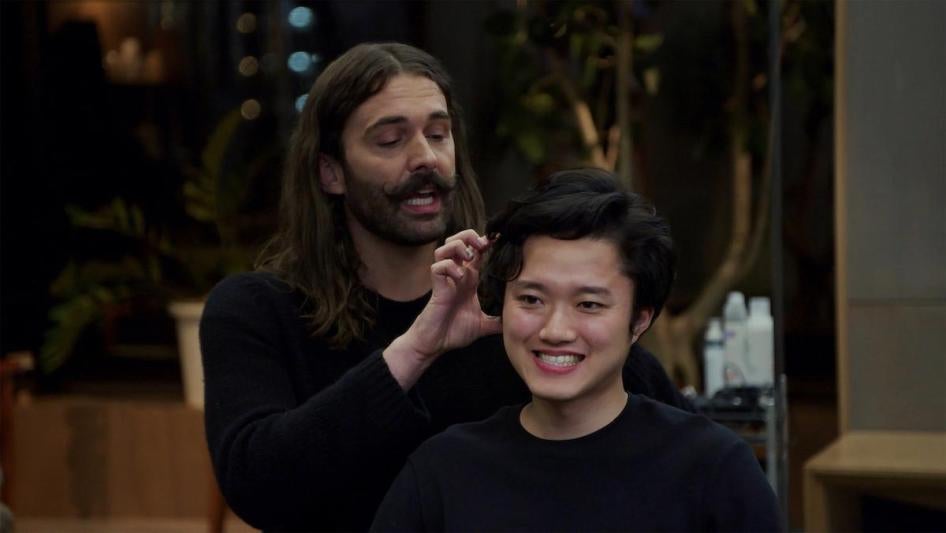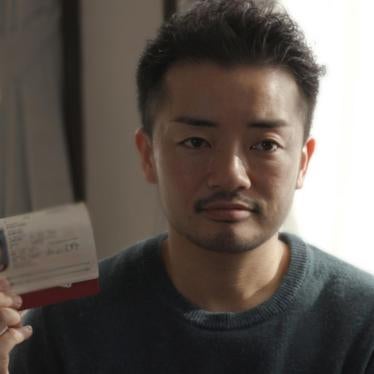What inspired you to take part in Queer Eye: We’re in Japan!?
The experience of working for Human Rights Watch definitely pushed me to be on Queer Eye.
With Human Rights Watch, I interviewed LGBT kids in Japan who were bullied. What struck me was that many LGBT kids said they have no information about LGBT people and issues. Since doing the project, I wanted to become a person who could give these kids some kind of information.
Did anyone you interviewed with Human Rights Watch stand out to you?
There was a transgender boy who was actually from my high school. We went to my home town and interviewed him, and I [think of him] and what he went through a lot.
Seeing these issues still existing in my hometown was heartbreaking.
Let’s talk about the show a bit. Was it really a surprise when the Fab 5 arrived?
Yes! I was just listening to Beyoncé and cleaning up my room, so I didn’t know they were coming to my house, and then I heard someone say “konnichiwa!” and when I turned back, they were just there. It was really surprising. Also, they smell really nice. That’s something TV cannot convey.
You mentioned educating LGBT kids, but why else did you want people to see your story?
Studying abroad in the United Kingdom, I had a hard time accepting myself again – not for being gay, but for being Asian. I got so [many] microaggressions on a daily basis. Then when I came back to Japan I also experienced microaggressions because of being gay.
I often felt quite uncomfortable, and I was looking for role models – LGBT people of color, but I couldn’t find any.
What’s something you hope kids watching your episode will take away?
I definitely want them to feel they are not alone. When I was young, I didn’t have any role models and I felt really hopeless. I hope I can be an example of a gay person who is living my life and trying my best to be happy.
What made you nervous about being on the show?
I was most worried about viewers’ reactions after it aired. I had a great time during the shooting, but I had no idea how it was going to be edited and how people would receive it. But everyone has been really sweet to me after the episode was released.
Have you kept up all the things they taught you?
I still encourage myself. I am definitely more confident now.
So you’re still “fabulous Kan” as they dubbed you on the show?
Yes, I would say so. I enjoy my new life and being new Kan.
In the show you seemed worried about being out at work. What has your coworkers’ reaction to your episode been?
Some of my colleagues watched my episode and then messaged me online supporting me. I think that was very sweet of them. What I really like about them is that they don’t tell me in public or loudly because they don’t want to hurt me by outing me by accident, for example.
I am not closeted at work, but I don’t talk about being gay a lot because I don’t think it is relevant. By how they approach me after seeing my episode I can tell they really care about me.
Do you think things are getting better for LGBT people in Japan?
I think some things are getting better. Around the time I worked with Human Rights Watch on that report was when the news media started discussing LGBT issues properly, I think. Before that, I felt that LGBT people were constantly mocked in the entertainment industry. But at the same time, I live in Tokyo and have really open-minded friends and family, so it is maybe easier here. There must be LGBT kids somewhere in Japan, in the countryside, who are feeling really hopeless. I know because I’m from the countryside.
What would you say to LGBT kids who don’t feel ready to come out to their families?
If LGBTQ kids could get support from their families that would be amazing, but their family environment [might mean that isn’t possible]. I don’t really want to encourage them to come out if they are not ready.
When I was really young, I had many years that I couldn’t go to school because I was depressed and felt every day like my life was ending. I want to tell that Kan “You are going to be okay.” And I want to tell the same thing to all the LGBT kids who are suffering now, but at this moment in Japan I feel like it is irresponsible to tell them that, because everyone’s family might not be accepting.
When I was in junior high school and high school, I didn’t have smartphones, or Twitter and Facebook, so it was really hard for me to connect with people similar to me. But I believe junior high school students and high school students can connect with other LGBT people more easily now. So, if they feel they can’t receive support from their families, they can find support elsewhere.
In the Netflix episode, you can see that my family totally accepts me now. But the process of being accepted as a gay person [was a journey]. I put in an effort, and I believe they also put in an effort. We tried to understand each other for a long time.
What more do you think needs to be done in Japan?
It should be mandatory for Japanese schools to teach kids about LGBTQ people and issues. Japan just revised the law to decide children’s education, but they didn’t make this change, despite the advocacy of Human Rights Watch and other organizations. We’ll have to wait another 10 years to revise this law again.
When I was a kid, I didn’t have any words to describe me. When you have information to describe yourself, I think you have a higher chance to accept yourself. Because I didn’t know what I was, I felt like I wouldn’t have a future. I want kids to have more information, and correct information.
How can they get this information if not from school?
Watch my episode! But seriously, I really like Netflix because it’s a platform that can reach ordinary people. They can just go to Netflix and watch the episode and get informed, I think that’s amazing.
Did you think the Queer Eye episode would change your life like it has?
After my episode aired, so many people started talking to me. I was at a Beyoncé night in Nichome (an LGBT neighborhood in Tokyo) and after it ended a woman came up to me and started talking about the episode and how amazing she thought it was and she started crying. Affecting people’s lives so positively is something I didn’t imagine could happen. When I think of it, I get teary too.
When I was 10, I couldn’t even get out of my house because I was scared and it feels amazing how far I came from there, and I hope that will happen to other people too.
What do you think you can tell LGBT children in Japan?
I want to tell them that the reason they are suffering is not because of them, but because of the society they are living in. We can see that in the way many people featured on the Queer Eye Japanese season blame themselves for being a [certain way], even though they shouldn’t.
I blamed myself, too, so I want them to stop doing that. We need to change society, and let people be more confident in themselves.
